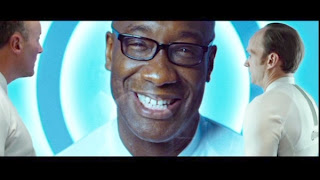SPOILER ALERT: Do not read if you haven't watched The Island.
“You are special. You were chosen for a purpose.”
The agnates are programmed to believe these lies while they stew in their pool
of goop and await the day when they are “hatched” and prepared to be given over
as an insurance policy. In a world where immortality is a lustrous possibility,
there is a price tag for the potential opting out of dealing with body parts
that will eventually fail. There is a place where “products” are made that
store your own spare parts for when your body gets too old or too broken to
function at its prime.
And who am I to judge? Honestly, who really wants to die
of kidney failure at thirty five? Or be infested with irreplaceable cancerous
organs at fifty with no foreseeable future. I can totally understand the allure
in this grand scheme. Until of course you realize that these “products” are
living, breathing, feeling, and functioning members of their own miniature
society. Or, until you are faced with the sad reality of watching their
excitement over getting a chance to go to “The Island.” The child-like
innocence of these people only adds to the horror once you realize that they
aren’t going to a tropical island, but to a butcher shop.
In this extremely
controlled environment the people in charge attempt to keep the “products” from
feeling emotions by monitoring proximity and the level of human interaction or
the depth of relationships, but with Lincoln the dominos come crumbling down.
Lincoln is curious. And that in a sense is the root of the “problem.” His
curiosity pushes him to make observations and ask questions that aren’t
expected of him. It’s interesting that curiosity is one main thing that is
often limited or controlled in the utopias that we’ve studied. By limiting
access to books, education, and cultural experiences people are less likely to
realize what is missing in their daily lives. The control certainly goes to an
extreme in this movie, but still fails in the end. The circumstances in this
movie leave viewers to question, what does it mean to be human? What parts make
up a complete person? Are there pieces that are more important than others? Are
there pieces that can be left out? We also might ask ourselves what extent
would we be willing to go to in order to save our own lives? It might seem frustrating
at first, but being left with a multitude of questions is a good thing. It’s
good to be curious.
Image #1: http://lydia.bradley.edu/hilltopics/11winter/images-features/home-aging.jpg
Image #2: http://i2.listal.com/image/4187973/600full-the-island-screenshot.jpg
Image #3:http://www.thezooom.com/wp-content/uploads/2013/01/Be-curious-Albert-Einstein-240x357.jpg



I've noticed the trend of "the curious explorer" in the Utopias we have studied. Someone is always curious about the system/society, finds a flaw in the system, and tries to change it. I think this aspect of Utopia is much needed. It allows the reader to learn more about the society through the eyes of the curious.
ReplyDeleteDon't forget too that, since they're growing these people to be the same age as the originals, they're being grown with all of the genetic defects that people have acquired over time. That's right: age is *inherent* in DNA as DNA mutates over time due to flaws in the DNA error correction system. By growing these people in old age, they're making organs that are ALREADY old .. so adding new (old) organs to these people who paid 3 million dollars are paying for a used part.
ReplyDelete